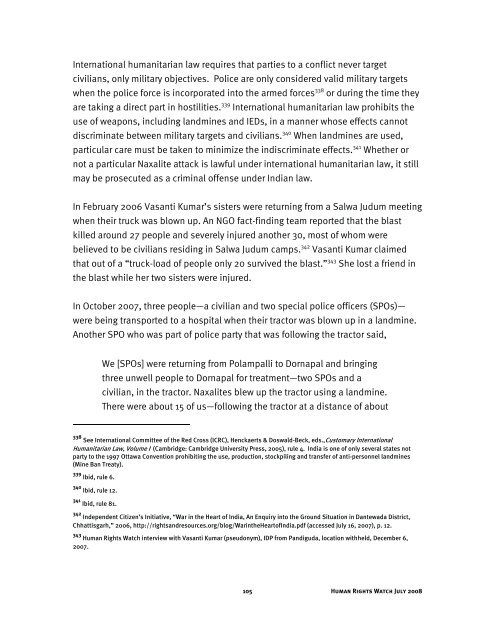âBeing Neutral is Our Biggest Crimeâ - Global Coalition to Protect ...
âBeing Neutral is Our Biggest Crimeâ - Global Coalition to Protect ...
âBeing Neutral is Our Biggest Crimeâ - Global Coalition to Protect ...
You also want an ePaper? Increase the reach of your titles
YUMPU automatically turns print PDFs into web optimized ePapers that Google loves.
International humanitarian law requires that parties <strong>to</strong> a conflict never target<br />
civilians, only military objectives. Police are only considered valid military targets<br />
when the police force <strong>is</strong> incorporated in<strong>to</strong> the armed forces 338 or during the time they<br />
are taking a direct part in hostilities. 339 International humanitarian law prohibits the<br />
use of weapons, including landmines and IEDs, in a manner whose effects cannot<br />
d<strong>is</strong>criminate between military targets and civilians. 340 When landmines are used,<br />
particular care must be taken <strong>to</strong> minimize the ind<strong>is</strong>criminate effects. 341 Whether or<br />
not a particular Naxalite attack <strong>is</strong> lawful under international humanitarian law, it still<br />
may be prosecuted as a criminal offense under Indian law.<br />
In February 2006 Vasanti Kumar’s s<strong>is</strong>ters were returning from a Salwa Judum meeting<br />
when their truck was blown up. An NGO fact-finding team reported that the blast<br />
killed around 27 people and severely injured another 30, most of whom were<br />
believed <strong>to</strong> be civilians residing in Salwa Judum camps. 342 Vasanti Kumar claimed<br />
that out of a “truck-load of people only 20 survived the blast.” 343 She lost a friend in<br />
the blast while her two s<strong>is</strong>ters were injured.<br />
In Oc<strong>to</strong>ber 2007, three people—a civilian and two special police officers (SPOs)—<br />
were being transported <strong>to</strong> a hospital when their trac<strong>to</strong>r was blown up in a landmine.<br />
Another SPO who was part of police party that was following the trac<strong>to</strong>r said,<br />
We [SPOs] were returning from Polampalli <strong>to</strong> Dornapal and bringing<br />
three unwell people <strong>to</strong> Dornapal for treatment—two SPOs and a<br />
civilian, in the trac<strong>to</strong>r. Naxalites blew up the trac<strong>to</strong>r using a landmine.<br />
There were about 15 of us—following the trac<strong>to</strong>r at a d<strong>is</strong>tance of about<br />
338 See International Committee of the Red Cross (ICRC), Henckaerts & Doswald-Beck, eds.,Cus<strong>to</strong>mary International<br />
Humanitarian Law, Volume I (Cambridge: Cambridge University Press, 2005), rule 4. India <strong>is</strong> one of only several states not<br />
party <strong>to</strong> the 1997 Ottawa Convention prohibiting the use, production, s<strong>to</strong>ckpiling and transfer of anti-personnel landmines<br />
(Mine Ban Treaty).<br />
339 Ibid, rule 6.<br />
340 Ibid, rule 12.<br />
341 Ibid, rule 81.<br />
342 Independent Citizen’s Initiative, “War in the Heart of India, An Enquiry in<strong>to</strong> the Ground Situation in Dantewada D<strong>is</strong>trict,<br />
Chhatt<strong>is</strong>garh,” 2006, http://rightsandresources.org/blog/WarintheHear<strong>to</strong>fIndia.pdf (accessed July 16, 2007), p. 12.<br />
343 Human Rights Watch interview with Vasanti Kumar (pseudonym), IDP from Pandiguda, location withheld, December 6,<br />
2007.<br />
105<br />
Human Rights Watch July 2008
















